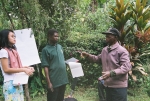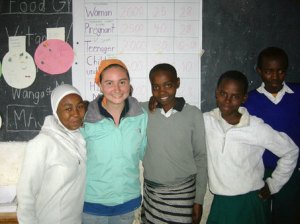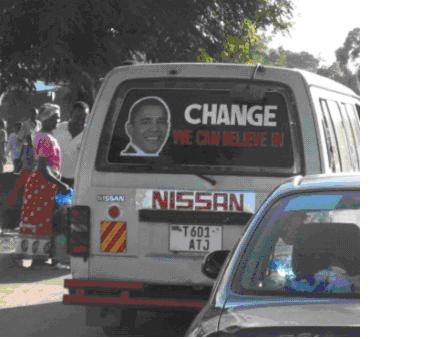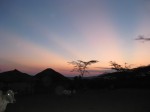
Editors note: Jennifer R. is a current participant in the HIV/AIDS Education and Prevention Program in Tanzania. She will be working with us for the next six months. We look forward to receiving more posts from her throughout her time in Tanziania! Thanks for the post Jennifer!
This past weekend, I had the pleasure of traveling to a place that was utterly other-worldly. It was like I walked onto the Discovery Channel or into a National Geographic special. I am going to use this word a lot in this entry, but I am in utter awe of all that I witnessed, just utter awe. There are few times in life when you experience true awe, I spent an entire two days like that. It was magical, mysterious, mystifying, miraculous, shocking in a fabulous way, or in a Sidipi (said see-dee-PEE) way, which is the Maasai word for fabulous. My descriptions here will never do it justice. I just cannot describe the stirring in my heart that happened while we were out in uncharted territory. It was as if I was standing in the spot where the birth of the human species took place, watching it as it would have taken place at that moment in history. It was truly an experience of a lifetime.
A group of seven from GSC were invited to be guests of Isaya and his Maasai family at his tribal home, a Boma (family village) deep in the heart of the Maasai Tribal lands about an two hours outside of the Arusha city limits. I have written about Isaya before, he was a translator at my school during the weeks of HIV/AIDS Day Camp. He is a warrior and a tribe chief for the Maasai Tribe of Tanzania. He is also one of five Maasai warriors that ran the London Marathon last year to raise money and awareness for their clean water project. You can find more information at www.massaimarathon.org
Here is some general information on the Maasai. They have been living this tribal lifestyle on these lands of Tanzania and Kenya for hundreds and hundreds of years and have actively discouraged modernizing or changing their nomadic way of life. It was like I stepped back in time to watch people live before the dawn of modern civilization. The traditional Massai Lifestyle centers around their cattle which constitutes their primary source of food, but they do also grow maize quite a bit now. The measure of a A Maasai myth relates that God gave them all the cattle on earth, to be put into their keeping. They are a large but very close community that works together to raise the cattle and the children and cultivate the lands that they live on. The society is patriarchal and polygamist, the family we stayed with had 1 baba (dad), 2 mamas/wives, 20 watoto (children), 10 from each wife. They all live together on the compound of land called a Boma, along with all of the cows and goats. Maasai men’s wealth is in terms of his cattle and children. A herd of 50 cattle is respectable and the more children the better. A man who has plenty of one but not the other is still considered poor by Maasai standards.
The patriarch of the Boma is Isaya’s father. He has his own hut and each wife has her own hut. The culture dictates that after a woman has given birth to more than 5 children, she gets to have her own hut to live in with the children. They build each hut in 3 days. The hut framework is formed of timber poles fixed directly into the ground and interwoven with a web of smaller branches, which is then plastered with a mix of mud, sticks, grass, cow dung and urine, and ash. Within this space the family cooks, eats, sleeps, socializes and stores food, fuel and other household possessions. Each hut also has a place for baby goats and baby cows to sleep so they are safe during the night. Isaya explained that the hut lasts about 10 years and then they start over and build a new one. This is where I slept, 4 of us in a bed made for 1 ½ to 2 people, with a 1 day old baby goat crying under us all night. I slept in my clothes and shoes, we did not shower for 2 days while tracking through the cow dung and goat dung and whatever else is out there. The flies are unbelievable, there is no way to describe how many flies are all around you. Continue reading ‘Maasai Tribal Village Weekend – I am in Awe’
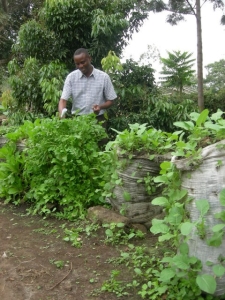
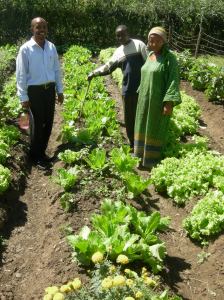
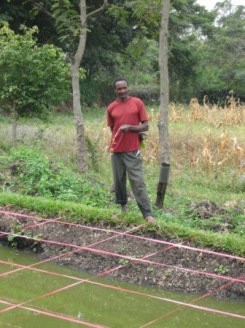 Photo: Mr. Kitomari on his families farm
Photo: Mr. Kitomari on his families farm